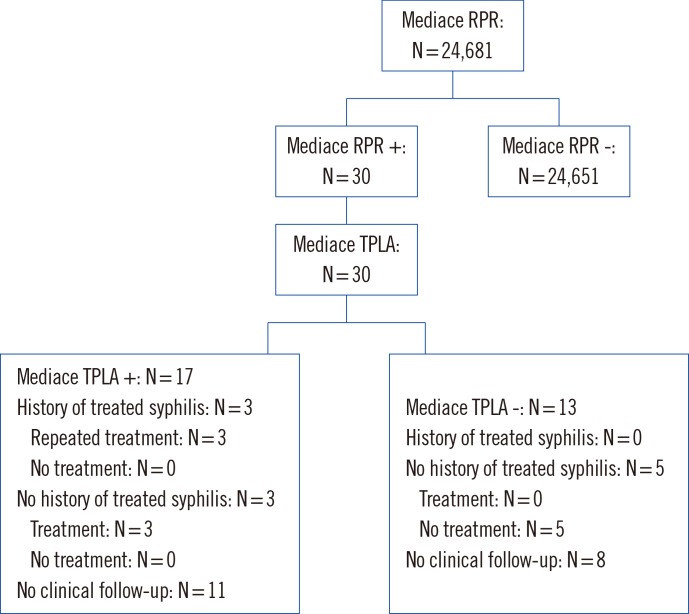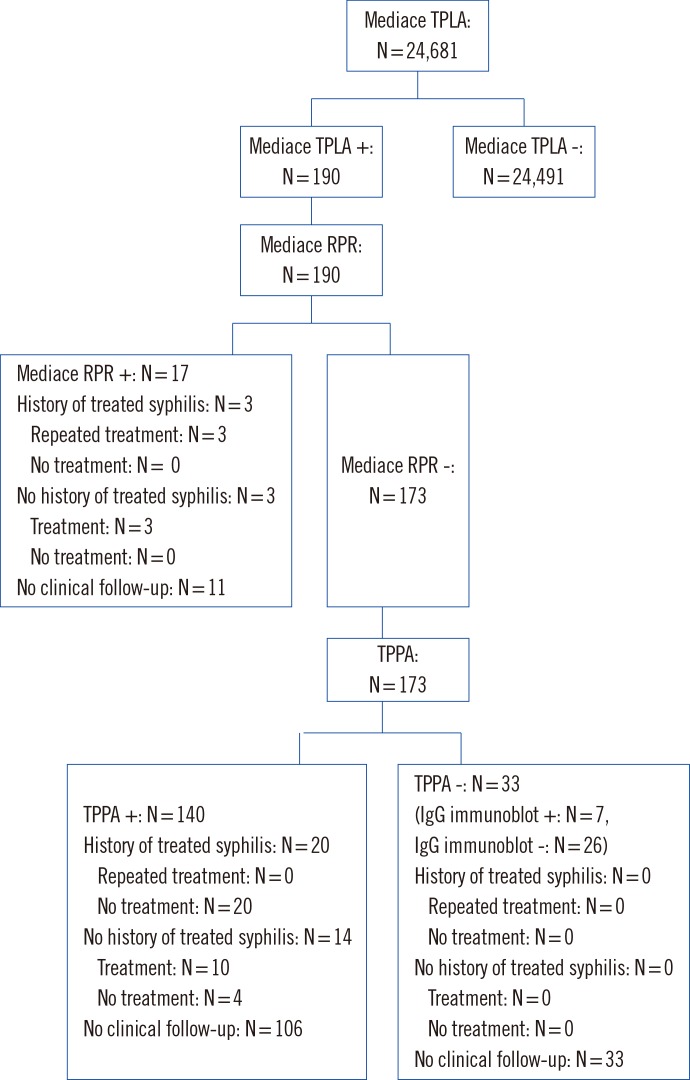Ann Lab Med.
2016 Jan;36(1):23-27. 10.3343/alm.2016.36.1.23.
Comparison of Automated Treponemal and Nontreponemal Test Algorithms as First-Line Syphilis Screening Assays
- Affiliations
-
- 1Department of Laboratory Medicine, Dongguk University Ilsan Hospital, Goyang, Korea. hjhuh@duih.org
- 2Department of Internal Medicine, Dongguk University Ilsan Hospital, Goyang, Korea.
- KMID: 2373493
- DOI: http://doi.org/10.3343/alm.2016.36.1.23
Abstract
- BACKGROUND
Automated Mediace Treponema pallidum latex agglutination (TPLA) and Mediace rapid plasma reagin (RPR) assays are used by many laboratories for syphilis diagnosis. This study compared the results of the traditional syphilis screening algorithm and a reverse algorithm using automated Mediace RPR or Mediace TPLA as first-line screening assays in subjects undergoing a health checkup.
METHODS
Samples from 24,681 persons were included in this study. We routinely performed Mediace RPR and Mediace TPLA simultaneously. Results were analyzed according to both the traditional algorithm and reverse algorithm. Samples with discordant results on the reverse algorithm (e.g., positive Mediace TPLA, negative Mediace RPR) were tested with Treponema pallidum particle agglutination (TPPA).
RESULTS
Among the 24,681 samples, 30 (0.1%) were found positive by traditional screening, and 190 (0.8%) by reverse screening. The identified syphilis rate and overall false-positive rate according to the traditional algorithm were lower than those according to the reverse algorithm (0.07% and 0.05% vs. 0.64% and 0.13%, respectively). A total of 173 discordant samples were tested with TPPA by using the reverse algorithm, of which 140 (80.9%) were TPPA positive.
CONCLUSIONS
Despite the increased false-positive results in populations with a low prevalence of syphilis, the reverse algorithm detected 140 samples with treponemal antibody that went undetected by the traditional algorithm. The reverse algorithm using Mediace TPLA as a screening test is more sensitive for the detection of syphilis.
MeSH Terms
Figure
Reference
-
1. Workowski KA, Berman S. Sexually transmitted diseases treatment guidelines, 2010. Morbidity and Mortality Weekly Report (MMWR), Recommendations and reports. Centers for Disease Control and Prevention;2010. 59:p. 1–110.2. Binnicker MJ. Which algorithm should be used to screen for syphilis? Curr Opin Infect Dis. 2012; 25:79–85. PMID: 22156894.
Article3. Centers for Disease Control and Prevention. Discordant results from reverse sequence syphilis screening--five laboratories, United States, 2006-2010. MMWR Morb Mortal Wkly Rep. 2011; 60:133–137. PMID: 21307823.4. Egglestone SI, Turner AJ. PHLS Syphilis Serology Working Group. Serological diagnosis of syphilis. Commun Dis Public Health. 2000; 3:158–162. PMID: 11014025.5. French P, Gomberg M, Janier M, Schmidt B, van Voorst Vader P, Young H. IUST. IUSTI: 2008 European Guidelines on the Management of Syphilis. Int J STD AIDS. 2009; 20:300–309. PMID: 19386965.
Article6. External quality assurance immunoserology data. Updated on 2013. http://www.lab-qa.org/sub/catalog.php?CatNo=43&Mode=view&no=283.7. Song EY, Yang JS, Chae SL, Kim S, Choi YS, Cha YJ. Current status of external quality assessment of syphilis test in Korea. Korean J Lab Med. 2008; 28:207–213. PMID: 18594173.
Article8. Huh HJ, Chae SL, Oh DJ, Park Q, Lim CS, Um TH, et al. Establishment and multicenter evaluation of a national reference panel for syphilis antibodies in Korea. Lab Med Online. 2014; 4:36–42.
Article9. Watanabe N, Nagatomo R, Okubo S, Yokota H, Ikeda H, Yatomi Y. Evaluation of latex agglutination test for anti-treponemal antibody in comparison with chemical luminescence tests. Rinsho Byori. 2011; 59:115–120. PMID: 21476292.10. Huh HJ, Chae SL. Analysis of false positive rates and concordance rates in architect syphilis TP assay and Mediace TPLA, automated syphilis serologic tests. Dongguk J Med. 2009; 16:236–242.11. Noh J, Ko HH, Yun Y, Choi YS, Lee SG, Shin S, et al. Evaluation of performance and false positivity of Mediace RPR test that uses a chemistry autoanalyzer. Korean J Lab Med. 2008; 28:312–318. PMID: 18728382.
Article12. Kim YS, Lee J, Lee HK, Kim H, Kwon HJ, Min KO, et al. Comparison of quantitative results among two automated Rapid Plasma Reagin (RPR) assays and a manual RPR test. Korean J Lab Med. 2009; 29:331–337. PMID: 19726896.
Article13. Binnicker MJ, Jespersen DJ, Rollins LO. Direct comparison of the traditional and reverse syphilis screening algorithms in a population with a low prevalence of syphilis. J Clin Microbiol. 2012; 50:148–150. PMID: 22090407.
Article14. Lipinsky D, Schreiber L, Kopel V, Shainberg B. Validation of reverse sequence screening for syphilis. J Clin Microbiol. 2012; 50:1501. PMID: 22259212.
Article15. Cho YH, Kim HO, Lee JB, Lee MG. Syphilis prevalence has rapidly decreased in South Korea. Sex Transm Infect. 2003; 79:323–324. PMID: 12902586.
Article16. Marangoni A, Moroni A, Accardo S, Cevenini R. Laboratory diagnosis of syphilis with automated immunoassays. J Clin Lab Anal. 2009; 23:1–6. PMID: 19140205.
Article17. Park IU, Chow JM, Bolan G, Stanley M, Shieh J, Schapiro JM. Screening for syphilis with the treponemal immunoassay: analysis of discordant serology results and implications for clinical management. J Infect Dis. 2011; 204:1297–1304. PMID: 21930610.
Article18. Loeffelholz MJ, Binnicker MJ. It is time to use treponema-specific antibody screening tests for diagnosis of syphilis. J Clin Microbiol. 2012; 50:2–6. PMID: 22090405.19. Jost H, Castro A, Cox D, Fakile Y, Kikkert S, Tun Y, et al. A comparison of the analytical level of agreement of nine treponemal assays for syphilis and possible implications for screening algorithms. BMJ Open. 2013; 3:e003347.
Article
- Full Text Links
- Actions
-
Cited
- CITED
-
- Close
- Share
- Similar articles
-
- Comparative Sensitivity of ARCHITECT Syphilis TP with Other Antibody Tests
- Serologic Response to Treatment in Human Immunodeficiency Virus-Negative Syphilis Patients Using Automated Serological Tests: Proposals for New Guidelines
- Report of the Korean Association of External Quality Assessment Service on Serological Tests for Syphilis (2020–2021)
- Seridiagnosis of Syphilis
- Evaluation of Automated Architect Syphilis TP as a Diagnostic Laboratory Screening Test for Syphilis



